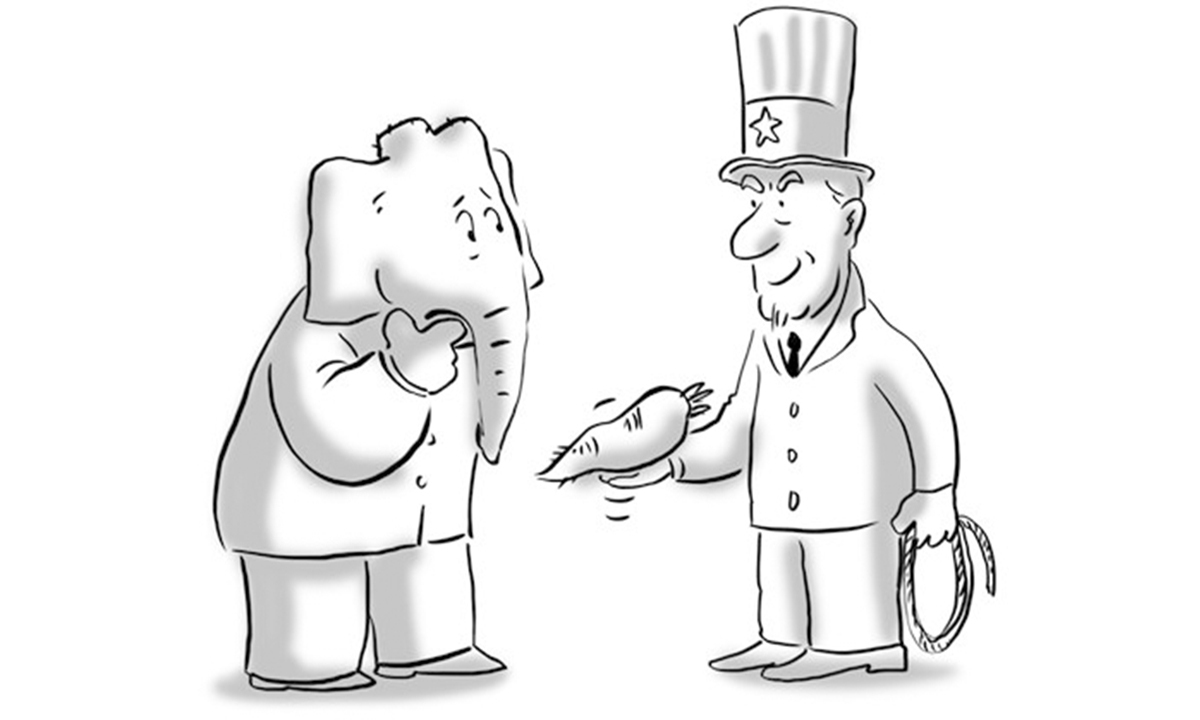Will non-aligned India break oath under US’ lure?
Source: Global Times Published: 2020/7/23 19:22:53

Illustration: Liu Rui/GT
Indian External Affairs Minister S. Jaishankar on Monday said that "non-alignment was a term of a particular era and geopolitical landscape" but New Delhi will never be part of an alliance. He said global shifts were opening spaces for middle powers including India. "But countries who depended more on the US are finding they have to take a call themselves on many issues," he noted.
Jaishankar's words imply that India will never become a treaty ally of the US and that India will not bind itself into the US alliance system.
Actually, cooperation between India and US in many fields can be labeled moves that allies make between themselves. For example, in the domain of security and defense, at least in the Indo-Pacific region, India has sided with the US. However, in terms of diplomatic rhetoric, New Delhi does not define itself as an ally of Washington.
India believes such strategy gives it greater diplomatic and strategic space.
Not being a US ally, India needn't assume responsibility toward the US. Therefore India can deal with its relations with other countries with more flexibility. This will help India maximize its interests.
India is the founder of the Non-Aligned Movement. However, there has been speculation that India would change its diplomacy of non-alignment, which is a political heritage of the Indian National Congress, instead of the ruling Bharatiya Janata Party. Actually, India is inclined to multi-alignments, but in diplomatically it has to underline its non-alignment position.
When tensions are ramping up between China and India, India seems to be moving closer to the US. For example, Washington and New Delhi held navy drills near the Andaman and Nicobar archipelago on Monday. Besides, although India and the US have not effectively put the spread of the deadly COVID-19 under control, the Indian government has approved of resuming US passenger flights to India starting July 23.
These moves seem to go against Jaishankar's statement. India says one thing, but does another. Even though India claims not to part of any alliance, its practice shows that it is inclined to the US. This also shows India's other consideration.
When China-India relations deteriorate, Indian nationalism would become strong, spurring some Indians to pursue a path to decouple from China. To compensate for the economic loss of decoupling from China, India has to seek closer economic ties with other economies such as the US. But given the fact that the two countries are much less complementary in economic terms, closer ties with the US will not effectively contribute to India's economy.
The US wishes to see India publicly break up with China. But India does not necessarily want so.
Granted, in terms of defense and security, New Delhi can be arguably an ally of Washington. The two countries will thus carry out closer cooperation. But India will be cautious to pick the US side publicly to confront China. China is much stronger than India. History has taught India well that fighting China will bring it no benefit.
Economically, China and India are highly complementary. From a global perspective, China is India's biggest opportunity. China is evolving from low-cost manufacturing to high-end, technologically advanced manufacturing. India could play a vital role of the next hub for cheap, high-volume commodity production.
India's future stance toward both the US and China will depend on quite a few factors. These include the China-India border issue, ties between India and Pakistan, and the role Moscow plays in New Delhi's diplomacy.
India has always pursued a dream of becoming a great power. But in the process of realizing the dream, the country has merely acted like a fox assuming the majesty of the tiger - and the tiger in this case is the US. However, New Delhi knows it cannot get too close with Washington - otherwise it could become a sidekick of the latter.
By keeping a proper distance from the US, India aims to make the world's largest two economies willing to cozy up to it. This is India's ideal goal. Therefore fundamentally speaking, India is still striving to strike a balance among major powers.
The article was compiled by Global Times reporter Lu Yuanzhi based on an interview with Lin Minwang, deputy director at the Center for South Asian Studies of Fudan University. opinion@globaltimes.com.cn
RELATED ARTICLES:
Posted in: VIEWPOINT